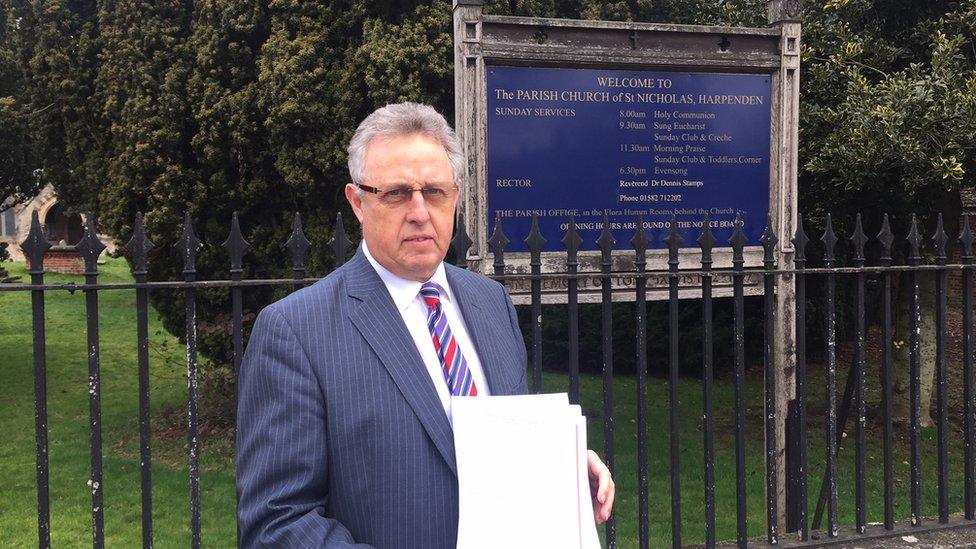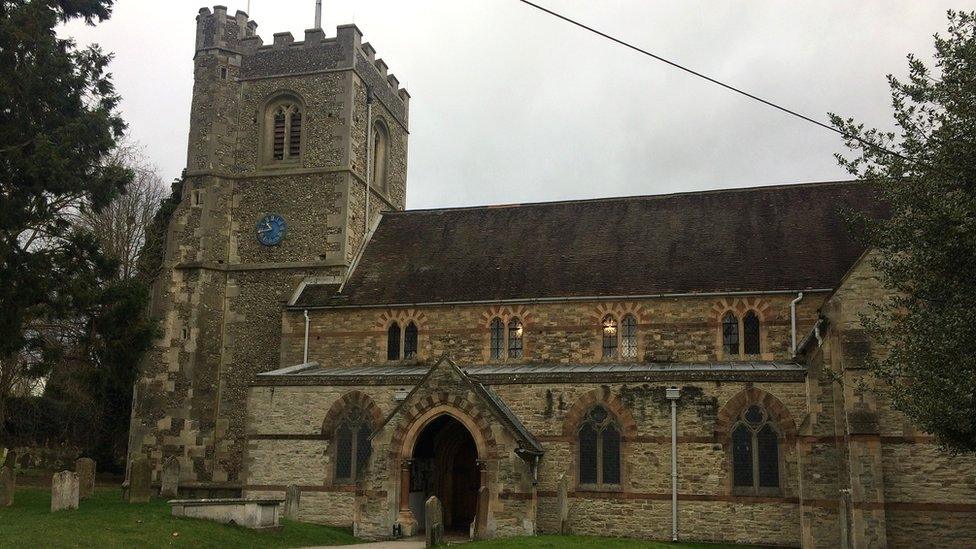Church potentially 'lost thousands' after HSBC closed its account
- Published

Rev Linda Williams says parishioners are worried about their money
A parish church in Hertfordshire says it has potentially lost thousands of pounds of donations after its bank account was closed for a fortnight.
HSBC closed the account of St Nicholas in Harpenden at the start of February.
It accused church staff of repeatedly failing to provide up-to-date details of individuals involved in the church's finances, which it said was vital to fight money-laundering and fraud.
The church says the bank has since reopened the account and apologised.
The "giving account" is used by the church for hundreds of parishioners to make donations by standing order, and has a monthly turnover of nearly £20,000.
Church volunteers say that initially they could not understand why the information was being requested, and assumed it did not apply to them.
When they did realise, they say the bank offered little support. In the end, it gave them a final deadline and then closed the account.
HSBC did reopen the account at the end of last week after speaking to officials from St Nicholas, and has promised to try to work with the church to resolve the situation.
'Where is my money?'
As a result of the closure, many standing orders have bounced, and the church was forced to write to parishioners to ask them to pay the missing money by cheque instead.
"We've had this account for a very long time," says the Rev Linda Williams. "Many of our parishioners are now worried, asking, 'Where is my money? Where is my standing order?'"
She says the giving account is vital for the church's finances.
"The big thing at this time of year is our utility bills. If we have a cash-flow problem, we'll have to take the money out of reserves, and we can't continue like that."

Peter Timms says the bank should have spoken to the church directly
Church treasurer Peter Timms is furious at HSBC's actions.
"I personally think the bank have been acting like little dictators," he says.
"This was very heavy-handed treatment, particularly for a charity run by volunteers. Banks should know their customers, and exercise a bit of common sense. If they're concerned, they should speak to us properly."
Safeguard
The details demanded were part of HSBC's controversial Safeguard programme.
It was set up in response to the bank being fined £1.2bn in 2012, over money laundering and sanctions busting. As a result, it agreed to spend hundreds of millions of pounds on a global "know-your-customer" programme.
This in turn meant many existing retail and business customers were asked for detailed personal information, with the warning of account restrictions and closures if they failed to comply.
Money Box has heard from other HSBC retail customers, charities and businesses angry at the level of information being demanded and the threatening letters they have received.
Some have had accounts closed or restricted. Others have moved their banking elsewhere in protest.
'Perplexed'
Dennis Stamps, the rector of St Nicholas, admits the church should have responded to the requests sooner, although he still doesn't understand why an existing customer would be asked for such detailed information.

The church says it relies on the account at this time of year to pay its utilities bills
"The person handling this account is an accountant by training, but she couldn't understand why the form was being sent to us, and how it applied to our particular charity.
"When we got another letter she was still perplexed about the information really being requested, so she inquired about that."
He also accuses the bank of failing to be supportive.
"When we realised we were struggling to complete the forms they wanted, we asked for an extension on closing the account, but the account was closed."
Protecting customers
HSBC said it would not comment on specific accounts, but said Safeguard was designed to protect customers' own interests by aiming to detect and protect against financial crime.
"This includes asking existing customers to provide additional information about themselves and the intended nature of their business with HSBC to make sure that our records are up-to-date and accurate," the bank said.
"While we understand this may cause some inconvenience for our customers, it is an important step we need to take to protect our customers' interests.
"Where a customer doesn't supply all of the information that we have asked of them, HSBC may be forced to close the customer's account."